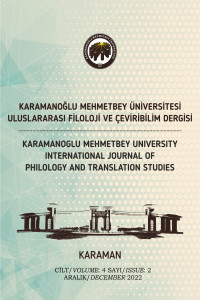Öz
Persian poetry has stepped to a new process in the 7th century after the Islamic conquests in Iran. In this period, although many verse genres passed from Arabic literature to Persian literature, genres of ode verses became more popular. Iranian rulers and viziers had poets in their palaces to promote themselves before the public and on the political ground. With poets such as Rudaki and Dakîkî, the ode reached the peak of its maturity during the Samanid era. In the post-Samanid period, the ode continued its development with the great support of the most famous ruler of the Ghaznavid State, Mahmud of Ghazni, to the poets. In this period, the subjects of the odes began to vary, and the scientific issues of the period began to be among the subjects of the odes. Naser Khosrow, one of the important ode poets of this period, also became a poet who emphasized religious, philosophical, and scientific issues in his odes. Moreover, he included his own understanding of poetry in his odes and put forward thoughts about poetry and poets. Naser Khosrow also displayed a negative attitude towards the palace poets and made accusations against them. He also criticized the poets who read poems in the style of ghazal. In this study, Naser Khosrow's understanding of poetry will be examined and his view of poets living in both his contemporary and previous periods will be tried to be revealed.
Anahtar Kelimeler
Kaynakça
- Atalay, Mehmet. (2012). “Unsurî”, Diyanet Ansiklopedisi, Cilt XLII, İstanbul, Türkiye Diyanet Vakfı Yayınları. Azamat, Nihat. (2006). “Nâsır-ı Hüsrev”, Diyanet Ansiklopedisi, Cilt XXXII, İstanbul, Türkiye Diyanet Vakfı Yayınları. Elmalı, Hüseyin. (1997). “Hassân b. Sâbit”, Diyanet Ansiklopedisi, Cilt XVI, İstanbul, Türkiye Diyanet Vakfı Yayınları. Elmalı, Hüseyin. (2011). “Kaside”, Diyanet Ansiklopedisi, Cilt XXIV, İstanbul, Türkiye Diyanet Vakfı Yayınları. Er, Rahmi. (2008). “Rü’be b. Accâc”, Diyanet Ansiklopedisi, Cilt XXXV, İstanbul, Türkiye Diyanet Vakfı Yayınları. Gulâmrızâyî, Muhammed. (1387hş.). Sî Kasîde-i Nâsır-ı Hüsrev, Tahran, Çâp-ı Dîbâ. İpekten, Haluk. (1996). “Gazel” Diyanet Ansiklopedisi, Cilt XIII, İstanbul, Türkiye Diyanet Vakfı Yayınları.
Öz
Fars şiiri, İran'da İslam fetihlerinden sonra VII. yüzyılda yeni bir sürece adım atmıştır. Bu dönemde birçok nazım türü Arap edebiyatından Fars edebiyatına geçse de daha çok kaside nazım türü revaç bulmuştur. İranlı hükümdarlar ve vezirler, kendilerini halk nezdinde ve siyasal zeminde tanıtmaları için saraylarında şairler bulundurmuşlardır. Kaside, Rûdekî, Dakîkî gibi şairlerle Sâmânîler devrinde olgunluğunun zirvesine erişmiştir. Sâmânîler sonrası dönemde kaside, Gazneliler Devleti'nin en meşhur hükümdarı Gazneli Mahmûd'un şairlere sunduğu büyük desteklerle gelişimini sürdürmüştür. Bu dönemde kasidelerin konuları da çeşitlilik arz etmeye başlamış ve dönemin ilmî meseleleri de kasidelerin mazmunları arasına girmeye başlamıştır. Bu devrin önemli kaside şairlerinden biri olan Nâsır-ı Hüsrev de kasidelerinde dinî, felsefî ve ilmî konuları öne çıkaran bir şair olmuştur. Dahası o, kasidelerinde kendi şiir anlayışına yer vermiş; şairliğe ve şairlere dair düşünceler ortaya koymuştur. Nâsır-ı Hüsrev, saray şairlerine yönelik olumsuz bir tutum da sergilemiş, onlara dönük suçlamalarda bulunmuştur. Ayrıca o, gazel tarzında şiirler söyleyen şairleri de tenkit etmiştir. Bu çalışmada Nâsır'ın şiir anlayışı incelenerek gerek çağdaşı gerek önceki dönemlerde yaşayan şairlere bakışı ortaya konulmaya çalışılacaktır.
Anahtar Kelimeler
Kaynakça
- Atalay, Mehmet. (2012). “Unsurî”, Diyanet Ansiklopedisi, Cilt XLII, İstanbul, Türkiye Diyanet Vakfı Yayınları. Azamat, Nihat. (2006). “Nâsır-ı Hüsrev”, Diyanet Ansiklopedisi, Cilt XXXII, İstanbul, Türkiye Diyanet Vakfı Yayınları. Elmalı, Hüseyin. (1997). “Hassân b. Sâbit”, Diyanet Ansiklopedisi, Cilt XVI, İstanbul, Türkiye Diyanet Vakfı Yayınları. Elmalı, Hüseyin. (2011). “Kaside”, Diyanet Ansiklopedisi, Cilt XXIV, İstanbul, Türkiye Diyanet Vakfı Yayınları. Er, Rahmi. (2008). “Rü’be b. Accâc”, Diyanet Ansiklopedisi, Cilt XXXV, İstanbul, Türkiye Diyanet Vakfı Yayınları. Gulâmrızâyî, Muhammed. (1387hş.). Sî Kasîde-i Nâsır-ı Hüsrev, Tahran, Çâp-ı Dîbâ. İpekten, Haluk. (1996). “Gazel” Diyanet Ansiklopedisi, Cilt XIII, İstanbul, Türkiye Diyanet Vakfı Yayınları.
Ayrıntılar
| Birincil Dil | Türkçe |
|---|---|
| Konular | Edebi Çalışmalar |
| Bölüm | Araştırma Makaleleri |
| Yazarlar | |
| Yayımlanma Tarihi | 30 Aralık 2022 |
| Gönderilme Tarihi | 10 Kasım 2022 |
| Kabul Tarihi | 21 Aralık 2022 |
| Yayımlandığı Sayı | Yıl 2022 Cilt: 4 Sayı: 2 |
422x119
Articles published in this journal are licensed under Creative Commons Attribution 4.0 International license. This journal does not charge APCs or submission charges. Articles published in this journal are permanently free for everyone to read, download, copy, distribute, print, search and link to the full texts of these articles. |












